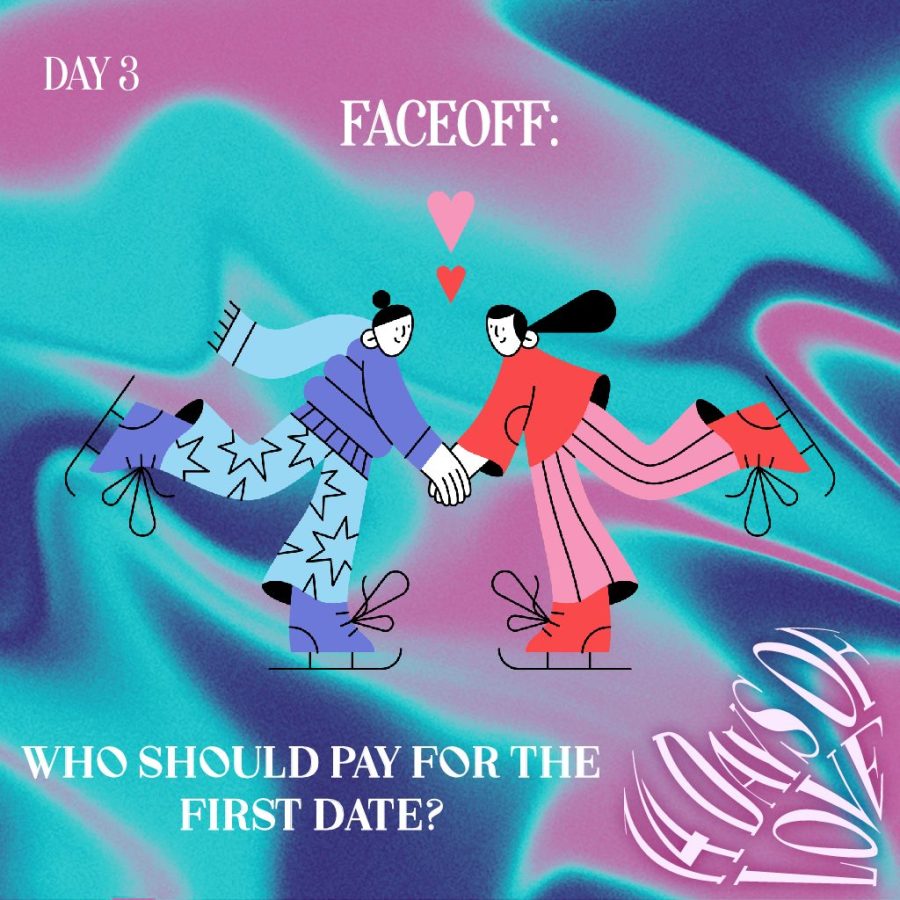14 Days of Love Day 3: Faceoff: Who Should Pay for the First Date?
February 3, 2023
Sam: The Recipient of the Date Invite
Humans have to make around 3,500 decisions a day. When one asks someone out on a first date, they choose to demonstrate interest in them and initiate a place and time to get to know them better. In between hustling to school, after school activities and more, someone made a decision amongst the other 3,500 they had that day to spend it with another person. Considering the initiator of the date has mustered up the courage to extend an invitation and made time to spend with another, they should not feel burdened to pay for the date.
While offering to pay for someone is polite, the pressure for the initiator to pay on the first date is unnecessary. Historically in heterosexual relationships, men paid for first dates because they worked and earned money while women traditionally did not. As with many other outdated practices, this expectation has changed; it is now just as common for a woman to pay on a date . If not paying, the recipient of the date often extends their willingness to pay or split the bill. The same goes for homosexual relationships; as many partners reject the idea of paying for the other, the recipient of the date may offer to pay or split the bill. The initiator of the date has already demonstrated their interest by asking the person on the date, so proving that they care for them through a monetary gesture is unnecessary.
To avoid any awkward confusion, the recipient of the date invitation can clarify who will pay before the date. If the recipient thinks they will pay or even split the bill, it is better to hash it out beforehand to avoid the stress and potential for awkwardness. Some may argue that asking to split the bill could be taken as a sign of “friendzoning.” A simple solution exists to combat this potential issue if the recipient enjoyed the date, but simply wants to split the bill. The recipient can demonstrate through verbal and physical expression that they are interested in the person without “friendzoning them.” Compliments, good chemistry and asking to hang out again will steer clear of any “friendzone” possibility.
Additionally, recipients may perceive getting paid for them as “owing” the initiator something. If the recipient did not like the first date, paying for at least their portion of it can extinguish any burden to continue communicating with that person. The recipient can end the date in a professional way that does not lead the initiator on.
Daniel: Whoever Proposed the Date
Being asked out on a date can be a gratifying experience; it demonstrates that someone is interested in you, and wants to spend time together. Accepting the invitation, while exciting, does not mean you should be expected to cover the cost of the date. The initiator of the date should pay because the burden is on them to justify why the two of them could have a good relationship.
From the start, the person who initiates has to demonstrate to the other person why the two of them would make a good couple. The first step involved is asking the other person out on a date, at which point the other person saw enough likable qualities in the initiator to accept their invitation. The importance of the initiator paying, though, is that it concludes the date by showing that the initiator cares. The initiator liked the other person enough to ask them out on the date, so that should also mean liking them enough to pay for the date. If the initiator does not pay for the date, it could imply that the initiator is uncommitted. If the other person was worth the time spent on the date, they should be worth the money. Making the initiator financially responsible for the date helps ensure a level of seriousness in dating.
Some may argue that because the initiator mustered the courage to ask someone out, they should not have to pay for the date. The thing is, courage does not entitle the initiator to a free date. The person who accepted the date does not owe the initiator anything. The idea that the recipient should pay for the date begs the question if they should pay, even when the date did not go as well as expected. That would leave them in the unfortunate position of having a disappointed heart and hurt wallet because of a date that was somebody else’s idea.
Of course, if the other person insists on paying or splitting the bill, then the initiator should allow them. The recipient could have their reasons for paying and the initiator should respect that. However, the default expectation should be that the initiator will pay.
When it comes to a date, it is best to finish what you started. At the end of the day, no matter the outcome, the person who initiated should be charged with funding the date. It is a sign of respect, and a gesture that demonstrates the initiator’s care for the recipient.











